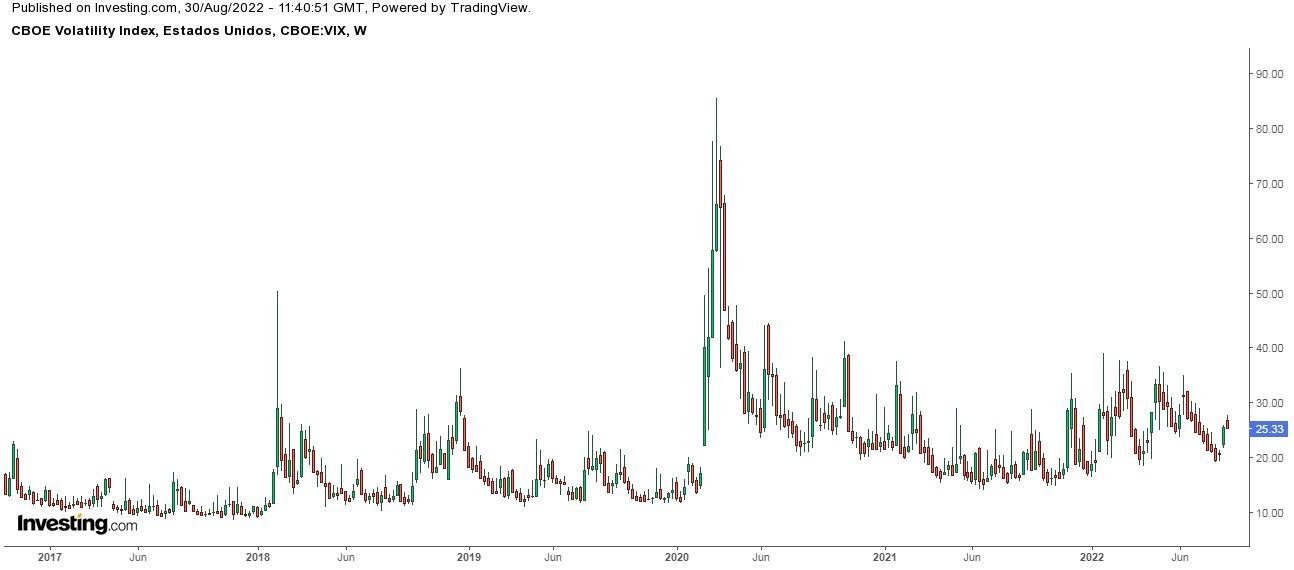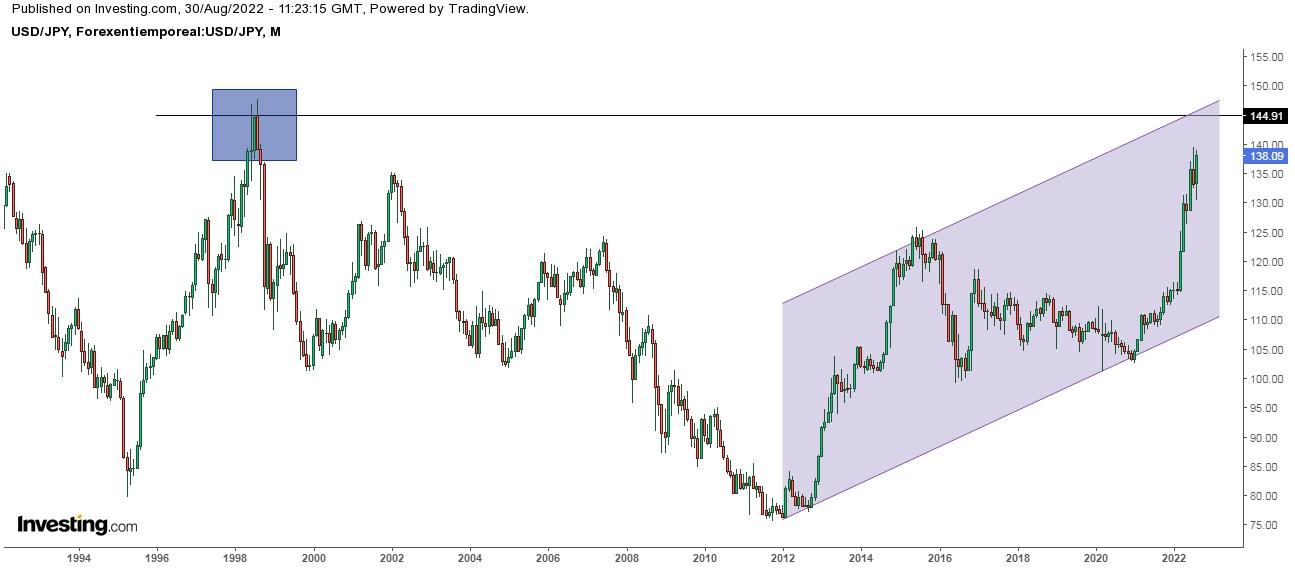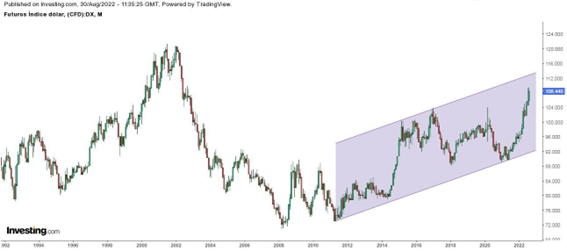- More than anything else, expectations matter
- The market is still repricing after being wrongfooted at Jackson Hole
- Currencies are reflecting the latest pressures
There is a guiding principle to market behavior that rises above fundamentals, above macro data, above central bank activity. It is the management of expectations that hold sway in the market.
Let's imagine that an important macro data point is due to come out. Let’s say that a number above 57 is good, but that the market expects the number to be 60. In the end, the data release shows 58.
The data itself is good because it beat 57. But since it missed the market’s expectation of 60, the market reacts, and that reaction is almost always an immediate drop.
I say all this because the markets, after the publication of the latest inflation data in the United States, began to convince itself and even price in the idea that the Federal Reserve, at its next meeting in September, would lift its foot off the accelerator and raise interest rates less (50 basis points instead of the recent 75 bps raises) and that in 2023 it would surely stop raising rates at some point, instead pivoting.
But reality is stubborn. At his Jackson Hole talk, Fed Chairman Jerome Powell reiterated that the goal is to control inflation no matter what, and that in his opinion households and businesses will suffer “some pain” in the fight against inflation, leading analysts to expect a 75 basis point hike in September (unless there comes a radical change in inflation in the weeks prior to the Fed meeting).
Cleveland Fed President Loretta Mester said she even favors raising interest rates above 4% early next year and keeping them there to curb price pressures. Moreover, she has acknowledged that the Fed got it wrong and that they should have started raising interest rates earlier.
The U.S. non-farm payrolls report came in above expectations at 315,000 jobs, above expectations of 300,000 jobs in August, bolstering the case for more aggressive rate hikes. The latest data also showed that job openings rose in July and consumer confidence rebounded significantly in August.
As for the European Central Bank, some are proposing a 75-point interest rate hike at its September 8 meeting. With energy priced in dollars, a weak euro makes it more expensive for the eurozone countries, adding inflationary pressure. A tighter monetary policy through aggressively raising interest rates is the path to strengthening the EUR/USD and combating this element of inflation.
Which is important, as inflation in the eurozone accelerated to 9.1% in August from 8.9% in July and broke a new record. Excluding energy, inflation rose to 5.8% from the previous 5.4%. And in Italy it rose to 8.4% in August, the highest in more than 36 years, rebounding from 7.9% the previous month.
It is these two related factors that have wrongfooted the market, hence the recent falls.
Thus, under "normal" conditions, September could be another delicate month.
It’s also worth remembering that on a historical basis, September is the worst month of the year for S&P 500 performance in terms of investment returns, both average return and frequency of positive returns. Over the last 20 years the average return is -1.18%, over the last 50 years -0.92%, and over the last 100 years -1.08%.
For all this, there was a sign last Friday that investors haven’t lost complete control of their emotions. While the S&P 500 fell more than -3%, the VIX volatility Index remained near 25, i.e. below levels it reached when the S&P 500 suffered similar declines this year.

Throw in that the S&P 500’s P/E is still above where it was at the end of the past 11 bear markets. This means that despite this year's declines, the stock market cannot be said to be priced as a bargain.
I also like to review drawdowns. A drawdown is the percentage drop in a market from its high to its low. It marks the magnitude of a given bear market.
The maximum drawdown so far in 2022 is as follows: S&P 500 -24%, Nasdaq -33%, Russell 2000 -27%.
To put this in perspective, here’s the size of the largest and smallest drawdowns from 1928 to 2020:
The largest drawdowns
- 1931: -57.5%
- 1932: -51%
- 2008: -49%
- 1937: -45%
- 1929: -44.6%
- 1930: -44.3%
- 1987: -34%
- 2002: -34%
- 2020: -34%
- 2009: -28%
The smallest drawdowns
- 1995: -2.5%
- 2017: -2.8%
- 1964: -3.5%
- 1961: -4.4%
- 1958: -4.4%
- 1954: -4.4%
The Impact of Expectations
Currencies are one of the most turbulent markets in terms of pricing in expectations to central banks' movements.
The Japanese yen has fallen nearly -4% this month and USD/JPY reached 139.40 in July.

The USD/JPY is very close to a new 24-year high and the 140 level, which may be a key level for the Bank of Japan. We will have to be on the alert in case the BoJ decides to intervene in the currency market at this level (remember that Japan propped up the yen during the Asian financial crisis of 1998, when it reached the 146 level).
The euro continues to deflate against the dollar, especially with the activation of the last bearish signal: the loss of support.

Short (bearish) positions in the euro have reached their highest levels since the start of the pandemic on the risk of energy prices dragging the region into recession.
It is notable that last week saw an increase in short positions in the euro (44,120 contracts versus 42,700 the previous week). The most recent record dates back to March 2020 with 86,700 contracts.
So far this year, the euro has lost -15% against the greenback and reached its lowest level in 20 years.
Meanwhile, the dollar index rose to 109, approaching its highest level in 20 years and on track for a third consecutive monthly gain.

